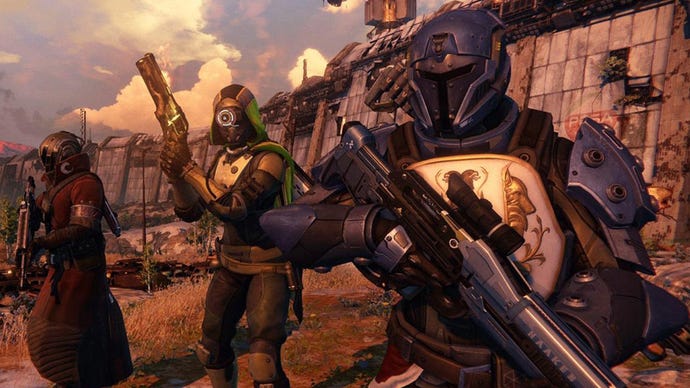Destiny could be the next Call of Duty
Destiny is standing by ready to step into Call of Duty's shoes should the behemoth ever take a tumble.
Destiny is an MMO that doesn't have a subscription, and that's weird, because Destiny is a very expensive game.
Oh, it's nothing near the $500 million figure Activision has been throwing around; the publisher might have spent that much on marketing by the time September comes around, but Bungie has said the game itself cost much, much less than that to make.
Nevertheless, it must have cost an absolute fortune. For one thing it's been in the works since before Halo 3: ODST released in 2009, likely dating back to Bungie's 2007 split with Microsoft. That's a long time.
The production values are through the roof. The incredible graphics and sound, the A-list vocal talent, the cross-platform release, the massive beta: all of this costs approximately $TheEarth.
It's not going to stop costing, either, because Destiny is an always-on MMO and that means tremendous ongoing server and development costs. According to the 2012-published contract between Activision and Bungie, Destiny is expected to produce three sequels and four expansion packs, releasing on alternate years.
That means the whole Bungie team is likely to be in full production at any given time. Normally triple-A development is cyclical, laying staff off when they're not needed during particular stages of development, or relying on outsourcing and contractors. Destiny's probably going to be in the works non-stop for at least six more years, judging by the original contract's terms.
We know the contract has been superseded, because at least one major pertinent detail has changed: Destiny was pushed back one whole year. We have reason to believe the general shape of things is the same, though. In a recent interview, a senior Bungie staffer casually tossed around mention of Destiny 2 and Destiny 3. The promise of two expansion packs in digital content included with special editions confirms Activision and Bungie intend to continue developing content for Destiny 1.
That's going to cost Activision huge amounts of money. Quality MMO development is hellishly expensive; Red 5 boss Mark Kern estimated that newbie content costs about $430,000 per hour of gameplay because players smash through it to get to end-game, where some hang around forever and many more trail off until the next expansion pops up. That's why so many MMOs utilise small, regular content drops to keep subscribers on board.
Activision, one half of the massive twin publisher that runs World of Warcraft, could presumably call on Blizzard's expertise to make a subscription MMO. It hasn't, though - it's backed Bungie's vision of an MMO specifically designed for consoles, and since we're all paying a network subscription, that means a monthly subscription is off the cards.
Instead, Destiny is going to rely solely on cover price to recoup its development costs - and hopefully pull in the fat profits suggested by that 2012 contract. That's a tremendous risk in an era when even regular budget triple-A games need to sell about 5 million copies to meet profit targets.
Perhaps only Activision could contemplate taking on such an enormous project as this. The publisher has been paying for at least part of Destiny since it signed the team back in 2010, and its confidence in the team shows in the terms of the contract. The hype surrounding the beta suggests the quality of the product has lived up to Bungie's compelling vision and Activision's gamble.
Was it hubris or faith in Bungie that motivated Activision to back such an outrageously bold endeavour? I don't think so. Because Activision has done this before, with Call of Duty.
The next Call of Duty?
I never thought I'd ever seriously be writing the phrase "the next Call of Duty". Call of Duty is a phenomenon. Apart from Grand Theft Auto, no gaming brand has as much international mainstream recognition. Every annual Call of Duty game since Modern Warfare 2 has sold tens of millions of copies. It outsells books, movies and CDs. It is the game bought by people who buy just one game a year. For many people, it just is video games.
But with Destiny, Activision is genuinely setting up a new Call of Duty: a franchises that produces a major release on a regular schedule, and sells gangbusters every single time.
Now that we're in the PS4 and Xbox One generation, you can't pop out a game every year and expect it to meet standards, which is why Activision has moved Call of Duty to a three-year development cycle, and Ubisoft Montreal rotates Assassin's Creed through multiple studios. That's why Destiny's going to alternate sequels with major expansions; maybe even multiple expansions between sequels. But the comparison stands: just as you buy new Call of Duty every year, you'll have new Destiny to buy every year.
Activision has copped a lot of flack for its increasingly narrow property catalogue, but with Call of Duty and Skylanders under its belt, the publisher knows how to launch and nurture a long-lived, regularly lucrative franchise.
Activision has copped a lot of flack for its increasingly narrow property catalogue, and I can't say I'm a fan of pushing the games industry to favour a small number of breathtakingly expensive tentpole hits, thereby of necessity reducing diversity and innovation. But with Call of Duty and Skylanders under its belt, Activision knows how to launch and nurture a long-lived, regularly lucrative franchise.
A fantasy inspired MMO shooter, Destiny is different enough from Call of Duty that I don't expect it to cannibalise the military shooter's sales. What interests me is that it doesn't have to; unless Advanced Warfare reverses the trend, there's a possibility Call of Duty's sales may be tapering off on their own.
Should the juggernaut fall, Activision's not going to be caught scurrying to turn a profit off Skylanders alone; Destiny is perfectly positioned to be the next Call of Duty.







.jpg?width=291&height=164&fit=crop&quality=80&format=jpg&auto=webp)



